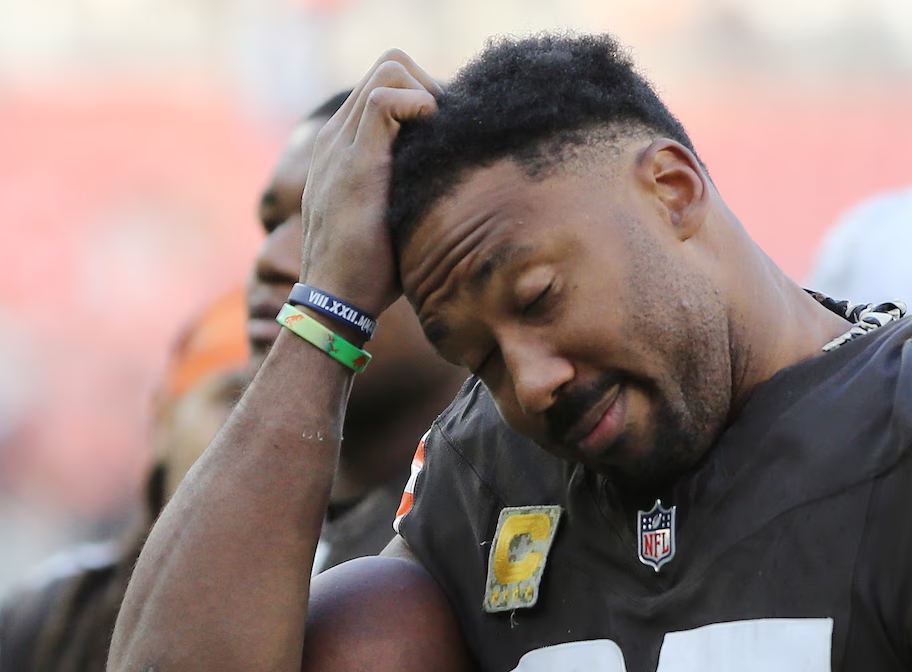CLEVELAND, Ohio — Browns edge rusher Myles Garrett owns part of the local basketball team. He enjoys pickup hoops in his free time. He counts Lakers forward LeBron James as a confidant and employs Klutch Sports, run by long-time James agent Rich Paul, as his representation.
So I understand why, when Garrett requested a trade from Cleveland on Monday, he expected general manager Andrew Berry to appease him. But Garrett’s world functions nothing like the NBA, where destinies (and destinations) change on a whim. Nope.
The football world treats trade requests like trade suggestions. Suggestions go in the suggestion box. And Berry’s suggestion box looks a lot like the trash can at this moment.
Notice the war of words in Garrett’s official statement? Nice touch. Signals a standoff. Might be enough to scare a general manager visiting Rocket Mortgage FieldHouse. But the top executive at 76 Lou Groza Blvd. will be harder to bully.
Berry, on the clock to rebound quick after a disastrous 2024 season, has no incentive to trade his best player (even if the franchise has plenty).
Garrett, who has two years remaining on the five-year, $125 million extension he signed in 2020, lacks the leverage enjoyed by pending hoops free agents. And that’s before we consider the franchise tag, a football-only power move designed to keep players home no matter how badly they want a new house.
The Browns had better trade Garrett, or else … what? He’s under contract through 2026 and can be franchise-tagged up to three times afterward. The risk of “losing Garrett for nothing” does not exist until at least 2027, his theoretical tag year, and that’s assuming they’d only tag him once. By then he’d be 32, 10 years into his career. Even by Hall-of-Fame pass rusher standards, that’s close to the end.
How much time can Garrett afford to waste?
He might argue such a question stamps his case. The Browns have wasted enough of his prime years, and it’s time for Garrett to chase something bigger than frivolous franchise records. No disagreement. I’d love to see Garrett play for a contender. And as written last month, I think the Browns should use a Garrett trade to start their rebuild.
I’m not the GM, though. And this isn’t the NBA, where players can force general managers’ hands by making the practice facility an uncomfortable workplace. I guess, in theory, Garrett could channel Heat forward Jimmy Butler by showing up late, or torpedoing practices, or stomping and whining outside Berry’s office until the GM makes a trade call.
But we don’t often see those tactics deployed in NFL locker rooms. Why? Good question.
My guess: Football’s brotherhood culture fosters intense teammate loyalty. Hurting the franchise means hurting your friends. Sometimes literally. In our most violent sport, quiet quitting during a game (or even during a padded practice) poses an injury risk, both to the quitter himself and the grinders around him.
That leaves players with one common weapon: The holdout. Distance yourself from the team. Challenge your general manager to a staring contest. If you threaten a franchise (and its fans) with your absence long enough, the thinking goes, the people in charge will placate your demands.
One problem for Garrett: Holdouts work better for new contracts than trades. Edge rusher Trey Hendrickson told the Bengals to shop him last spring because he wanted a longer-term contact. He played 2024 on a reworked one-year deal.
Jets edge rusher Hassan Reddick requested a trade four months after landing in New York last season. He sat out the first six weeks insisting he wouldn’t play without, again, a long-term contract. He ended up playing 10 games after the Jets reworked his one-year deal.
Lamar Jackson tweeted his trade request from the Ravens two years back, just like Garrett did Monday. He bid Baltimore fans goodbye as he reportedly aimed for a bigger guaranteed contract than Browns quarterback Deshaun Watson. One month later, he signed a five-year extension worth almost $50 million fewer guaranteed dollars than Watson’s.
Need I go on? Money talks, and players have to listen. Because football executives hold the power in these negotiations. We can debate whether that should be the case, or whether Garrett’s trade suggestion doubles as a raise request. But we can’t ignore the facts.
Garrett owns a basketball team, plays pickup in his spare time and employs an agency with plenty of NBA clout. But the Browns’ star pass rusher plays football for a living. And when it comes to trade requests, he chose the wrong sport.
Football Insider newsletter free trial: Take a minute and sign up for a free trial of our Football Insider newsletter, featuring exclusive content from cleveland.com’s Browns reporters.
